On Saturday, October 14, 2023 @ 5:00 PM a festive spaghetti dinner will be held to raise funds for the 2024 Youth Mission Trip. Please let us know if you are attending by using the sign-up sheet in the narthex, or emailing the parish office at parishmanager@saintmattsec.org. Donation amount requested: $10/person, $35 max/family. Calling all bakers! We need a batch of your favorite cookies/brownies/bars to finish off our meal. Please let the parish office know if you can help us out. Thank you!
Category: Fr Dave
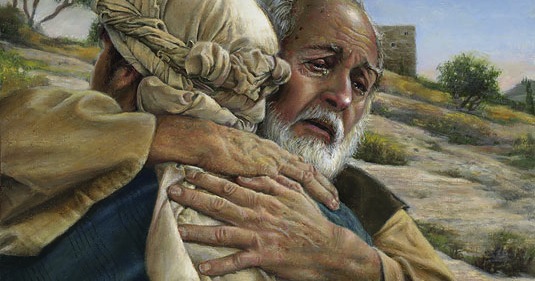
Dear Friends,
Luke’s Gospel gives us the precious story popularly called “The Prodigal Son,” although the true central figure is the Loving Father, who has two sons. No single story told by Jesus may have been able to so succinctly summarize his entire ministry. He tells it to explain himself to the “Elder Sons” of Israel, the religious leaders who disapprove of his search and welcome given to obvious sinners. How wonderful to see the heart of God revealed as wanting to gather everyone, the “not quite so good as they think” and the “bad” alike, into His feast!
Saint Paul teaches the content of the “Prodigal Son” in his call to the Corinthians to be reconciled to God, a new creation in Christ. In Christ, we see a God who wants to reconcile (bring into his life and fully restore) all the people of our world. So it’s important that we leave behind human categories that separate and judge people, and take the view of God in Christ.
In the reading from Joshua, we come to the moment when the people of Israel end forty years of wandering in the wilderness. They have crossed the Jordan river to enter the land promised to Abraham and keep the Passover meal in remembrance of their deliverance from Eqypt. So it is that the “prodigal nation” that had rebelled and wandered so long now comes home into the feast prepared for them by the Lord.
Comment: The saying is often true that “we are our own worst enemies.” It is terribly easy for me to lose sight of God’s good and loving heart. Sometimes I run after my own desires to my own loss, and other times simply refuse the way God shows me. Other times I find myself criticizing and judging other people as unworthy or inadequate in some way. In each case, I keep myself out of the feast of knowing and sharing in God’s desire to seek and gather all. O Amazing Grace that gathers me, may I see with your eyes, and love with your heart!David S. Robinson, RectorSaint Matthew’s Episcopal ChurchMaple Glen, PA 19002

1 Samuel 2:1-10
Hebrews 10:11-25
Mark 13:1-8
1 Samuel contains the “Song of Hannah”. Hannah receives the gift of a firstborn son, and expresses her gratitude and amazement at the Lord who acknowledges the cry of a humble woman. A little further along in the story she dedicates her son to the Lord, and this son becomes one of the great prophets of Israel named Samuel.
In Mark 13, Jesus replies to his disciples, who express admiration for the great buildings of the temple in Jerusalem: “…All will be thrown down.” Whey they want to know when this will happen, he tells them not to be led astray by the many who will come in his name to say the end has come, and gives no specific answer to their question.
Hebrews 10:11-25 continues the discussion of the priesthood of Jesus in comparison to the temple priesthood of his time. In contrast to the necessity of daily offerings, again and again, at the temple, Christ’s offering is once and for all time. The forgiveness he offers is complete, replacing and fulfilling all offerings for sin. With Christ “seated at the right hand of God” we can approach God full of assurance and hope.
Comment: In what do you place your hope? I learn from Jesus that the things people build (that I build!) will not last. Temples, governments, and other human “construction projects” or plans will come to an end. Because I have been given a safe and secure life to this point, I am helped by Hannah not to take this for granted but give thanks every day for the blessings I receive. Hannah’s song helps me to be more vividly aware of brothers and sisters around me who suffer greatly, and I’m challenged to be responsive and generous in giving help where I can. And may I learn, with Hannah, how to offer the greatest gifts I receive to the service of the Lord, in whose mercy is my true and lasting hope.
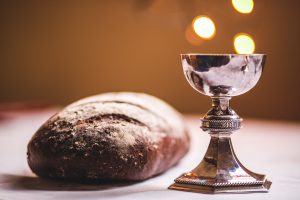
1 Kings 19:4-8
Psalm 34:1-8
Ephesians 4:25 – 5:2
John 6:35, 41-51
In this reading from 1 Kings, the prophet Elijah is fed and encouraged by the intervention of angels so that he might make a 40 day journey through the wilderness to the mountain of God.
John’s Gospel continues from last week, in which Jesus is declared as the Bread of Life. This week we hear some take offense at this claim, pointing out his human nature. How can he be compared to the supernatural food (manna) given to Israel in the wilderness? John’s Gospel nonetheless insists that those who believe, trust, and follow Christ will find that in so doing they receive a life that is greater than death, enduring forever.
In Paul’s instructions to the Ephesians, we see that people of the early churches acted very much the way people have always acted. Anger, bitterness, slander and falsehood always seem to rise up among us. These things are to be countered with kindness, forgiveness, and Christ like love.
Comment: Jesus is the one who sustains me through the inevitable challenges of life. He is the supernatural gift from God I need. How blessed to be able to look to Christ when I am weary and stressed! How refreshing to listen to Jesus as an antidote to the endless political fault finding and blaming of human society. Jesus is also the one who challenges me to be a witness to his way in a troubled world, a way of forgiveness, kindness, and love.
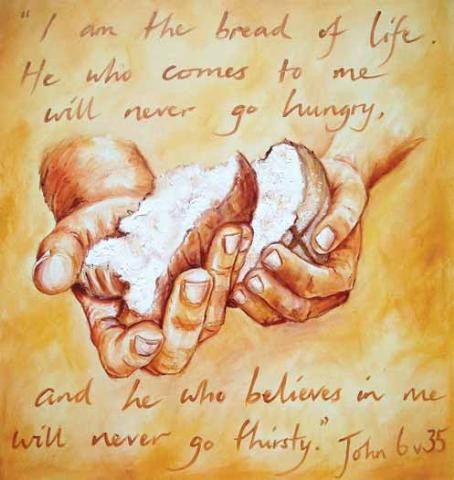
Exodus 16:2-4,9-15
Psalm 78:23-29
Ephesians 4:1-16
John 6:24-35
In the reading from Exodus we hear the story of the people of Israel complaining in the wilderness after the escape from Egypt. They demand of Moses to know how they will get food and water in this place. God responds to their complaint by providing meat by day and the manna bread by night.
In the Gospel of John, Jesus is declared as the Bread of Life. He is aware of our need for physical bread, having fed the hungry crowd with bread. But now we hear him describe bread in another way – not the kind of bread that temporarily meets our physical needs, but the “bread” that never stops satisfying our deepest hunger and thirst. One “eats” of this bread by coming into God’s life by depending on Jesus and following him.
Paul encourages the Ephesians to lead a life worthy of their call in Christ. Noting that the Spirit of God is given to all members of Christ for the building up of the community, he calls on them to exercise these gifts and ministries for the good of all. He also warns them not to be shifting about with the changing fashions and opinions being expressed by the people and culture around them, but to be mature and grounded in Christ.
Comment: God provides freedom and food to the people of Israel; Jesus feeds the crowds and invites them to a deeper satisfaction and purpose; Paul notes how God’s Spirit is so generously poured out upon the church as gifts for one another. Yet how easily we can complain, feel empty, and go about looking for something to “fill us up” or bring “happiness.” I am encouraged by these scriptures to remember, and renew myself, in the call of Christ to be doing the work of God. What is that work? To allow God’s Spirit to activate gifts in me that are for others. How blessed we are, each believer, to be part of this desire of God to touch our world, our communities, our neighbors, thorough such ordinary people as you and me!
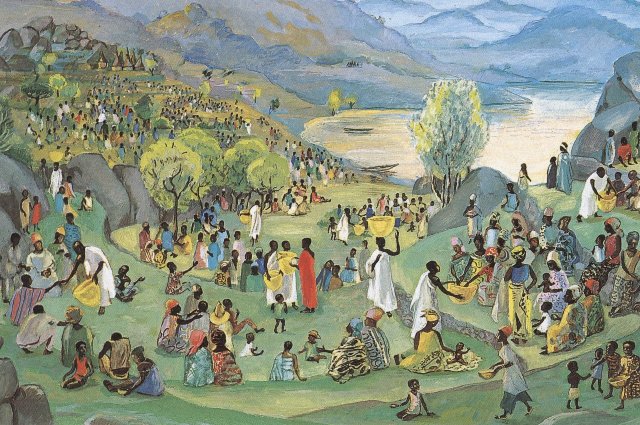
2 King 4:42-44
Psalm 145:10-19
Ephesians 3:14-21
John 6:1-21
Dear Friends,
In 2 Kings we have the story of Elijah who has twenty barley loaves to set before one hundred people. They all ate and had leftovers. Barley loaves are small – one loaf would not quite make a meal for one person – but Elijah trusts that the Lord will provide.
In the Gospel reading from John, Andrew asked Jesus how the five barley loaves and two fish could possibly feed the huge crowd of thousands that had gathered. As with Elijah, the food is given out to the people and there are ample leftovers.
Paul speaks to the Christians in Ephesus about the Heavenly Father who abundantly pours out from His riches to bless, enlighten, and strengthen his people until they are “filled with all the fullness of God.”
Comment: I don’t know how many of us would have the courage to set 5 loaves before a great crowd, or even twenty loaves before a much smaller crowd. Both Elijah and Jesus are models of radical trust in God’s ability to provide! There continue today to be reports of rare events where pots of food have not run out when shared with the needy, though most of the time the pot simply runs dry. Such things are beyond our control and in the hands of God. But one act of trust we all can share in is the simple act of generosity and sharing with others. The point for me is not to “try for miracles” but to give whatever I have to offer. That is what I can do, and I need to trust God to provide beyond anything I can do.
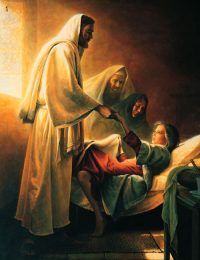
Lamentations3:21-33
2 Corinthians 8:7-15
Mark 5:21-43
Lamentations 3 contains a powerful affirmation of God’s daily love and mercy that never end. When we fail to understand what we are experiencing, or perhaps understand it all too well when confronted with adversity, grief and death, this scripture calls on us to keep quiet trust in the Lord.
In Mark 5, Jesus is on his way to save a little girl from death when he is touched by a sick woman. Rather than chastise the woman, who was “unclean” due to her bleeding for “contaminating” him, Jesus commends her faith that led to her healing. He goes to the dying girl, arriving “too late.” She has already died, but ignoring the skeptics, he touches the girl and heals her.
Paul challenges the Church in Corinth to excel in generosity, as he gathers funds to send to the churches suffering the effects of a prolonged drought and famine in Palestine. From his perspective, this is not a burden. You can’t share what you don’t have, and if you do have, then you have something to share.
Comment: In one way or another, all three readings invite us to trust God. There are times when it seems we can only wait with hope in God – we’ve prayed and sought the Lord’s help but our situation is not changed. There are times when we boldly seek the help of Jesus the risen Lord, and our prayer is answered! And there are times when we are challenged to be the answer to another’s prayer. In all these ways, and others, may we live as people of faith.
Pentecost and the Slow Work of God

A Jesuit priest and scientist named Pierre Teilhard de Chardin wrote something about the slow work of God that I like very much.
He said:“Above all, trust in the slow work of God. We are, quite naturally, impatient in everything to reach the end without delay. We should like to skip the intermediate stages. We are impatient of being on the way to something unknown, something new. And yet it is the law of all progress that it is made by passing through some stages of instability — and that it may take a very long time…
“And so I think it is with you. Your ideas mature gradually – let them grow, let them shape themselves, without undue haste. Don’t try to force them on, as though you could be today what time (that is to say, grace and circumstances acting on your own good will) will make of you tomorrow…
“Only God could say what this new spirit gradually forming within you will be. Give Our Lord the benefit of believing that his hand is leading you, and accept the anxiety of feeling yourself in suspense and incomplete.”
– Pierre Teilhard de Chardin, S.J. (1881-1955)
De Chardin seems to be talking about the growth and development of an individual human being, a human “soul.” We do so easily become impatient with ourselves and our life situation. And we certainly can be impatient with the “slow progress,” apparent “no progress,” or even “reverse progress” in the people who impact our lives.
I think this also speaks to our common life: our communities, our churches, our country, our world. There is so much that is incomplete, not worked out, lacking progress, or apparently going backwards!
Am I able to “accept the anxiety of feeling myself (or someone in my life, or my world) in suspense and incomplete?” I need help with this. Why can’t I (or we, or they) get my (or our) act together?
As much as I wish it were not so, I am not in control of my own life and circumstances.
Even though parents rightly exert a great deal of influence upon their children, we are delusional to think we actually control them! As de Chardin notes, I can have a good will, good intentions, a good plan; but time and circumstances may not go “my” way.
And what social or political process in all of human history was ever anything but messy, compromised, and more or less corrupt? None that I’ve ever seen or heard of.
So what’s left to us? It is called grace, which is described by De Chardin in this simple invitation: “Give our Lord the benefit of believing that his hand is leading you.” Pentecost trying to tell us about this – that God’s invisible presence, the Holy Spirit, the guidance of Jesus, is working among us.
Meanwhile, may we trust God’s Spirit and work at loving our neighbors – all of them.
~ Dave Robinson
This article was originally posted in the Oracle Newsletter Summer 2018 edition. Other articles by Fr. Dave Robinson can be found here.

Numbers 21:4-9
Ephesians 2:1-10
John 3:14-21
The reading from Numbers describes the people of Israel who are grumbling against God’s leadership and provision as they declare, “we detest this miserable food.” The poisonous serpents of the wilderness are interpreted by the grumblers as God’s punishment for this attitude. As a cure for those who are bitten, God gives Moses the sign of a serpent lifted on a pole. Those who look at the serpent do not die.
Paul tells the followers of Jesus in Ephesus that God is rich in mercy and acts out of great love for us even when we are “dead through trespasses.” They were “dead” or unresponsive to God’s life because they lived for the world, themselves and other spiritual influences. He reminds them of the gracious gift of God that has given them a new life in Christ, created for good works prepared by God.
Jesus speaks with Nicodemus in John’s Gospel, comparing himself to the sign given by God in the wilderness (the serpent lifted up) that people may escape death by coming to him for life. We are told God wants to save everyone and that belief in Jesus is what saves us.
Comment: The lessons of this Sunday tell us that even when people are turned against God, God acts with mercy and love to save them from themselves. Yet there also consequences when we are turned away from God – if not the literal death as in the Numbers story, there is a very real spiritual death of being dead to God and left to our own devices. In Lent I admit that I am often quick to want my own way with things, and quick to dislike the “food” that God sends to fill my life. How often do I grumble at what God sends my way? So I see my need to daily ask if I am truly opening my heart and mind to receive and trust the way, truth, and life of God that is offered me in Christ Jesus in all the circumstances of my life – both those that seem good to me and those that do not!
What are you doing for Lent?
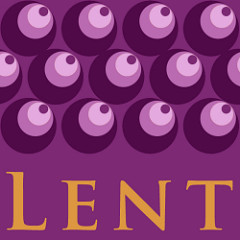

Are you “giving up something?” Are you “taking up” something? A little of both? Some things to consider:
Take up a book. A classic on the core practices of Christian life is Celebration of Discipline by Richard Foster. This is available through Amazon.com, and I’m so old I read it when it first came out in 1978. Foster takes up topics like Prayer, Fasting, Simplicity or Service and takes you deeper.
Give up (or cut back) something/anything that is not good for you, and that you hopefully intend to continue to do without after Lent.
That “something” might be an attitude that really is not helping you – a critical or judgmental spirit, a tendency towards self-pity, or the enjoyment of gossip.
In contrast we can actively cultivate and “take up” attitudes we know we need: gratitude, thanksgiving, patience.
If our lives are too busy, we may explore ways to simplify and give up some activities that really are not essential, if only for a season, to see what happens.
It may mean seeking to take up the spiritual practices we already keep such as worship, prayer, or service, but with greater attention. Get into the pew two minutes earlier to reflect on your week and offer your needs to God…when saying grace at dinner take a further moment to name at least one thanksgiving for the day.
Whatever you take up or give up, keep it simple. Get help from others as you may need it. Give God the opportunity to speak to you in new ways this Lent. God is always there, waiting and ready for our hearts.
Some other ideas for Lent:
Creating a Lenten Prayer Space at Home